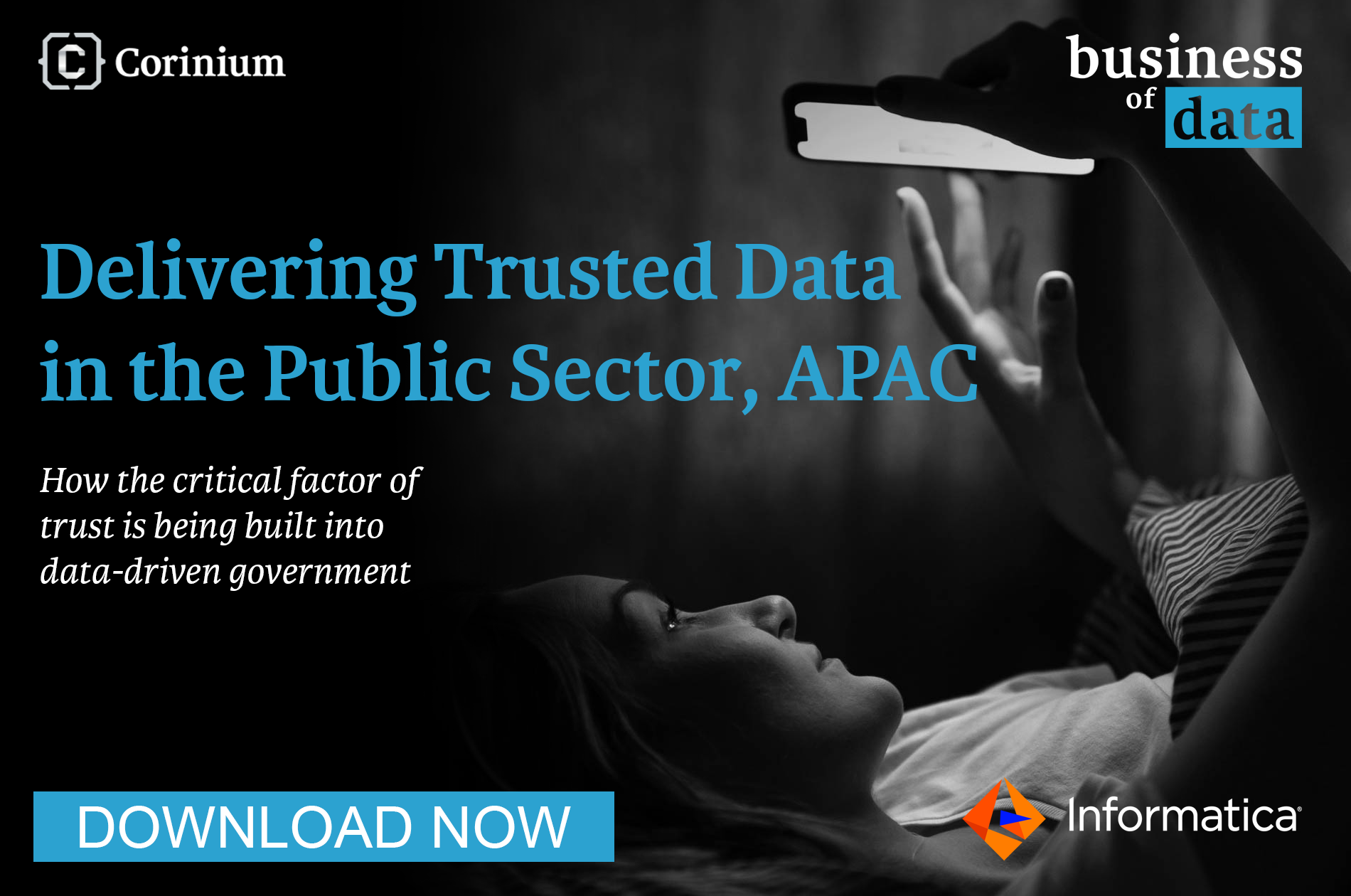APAC Government Data Execs Define Trusted Data

In this excerpt from Corinium’s Delivering Trusted Data in the Public Sector report, Government data executives from Asia Pacific describe what trusted data means to them
Ensuring trust in government data can mean several different things. It touches on considerations around data privacy, on how data is collected and then used in aggregate to make decisions, as well as if and how it is shared with other government organisations.
To understand what trusted data might mean in a digital government context, we asked data leaders from government agencies in Australia, New Zealand and Malaysia what trusted government data means to them.
For Dr Maria Milosavljevic, Chief Data Integration Officer for the Australian Department of Defence, there are many layers to the concept of building trust in government data, ranging from data quality to handling and the security and privacy concerns in between.
“Firstly, we must ensure that the data itself is trustworthy,” she says. “This includes aspects such as the quality of the data, the integrity and availability and so on.
“One vital component is the controls that are placed on the data, including security and privacy controls which reduce the risk of the data being compromised.
“Then there’s also the people who access the data and building trust in the processes and integrity of the broader system of work to make sure that this is appropriate.
The robustness of ICT infrastructure, systems and networks are also critical parts of the whole solution.
“It is also important to ensure that all the elements are included in considerations of trustworthiness. People most often think only about security and privacy, but there are other
important factors such as data integrity, process integrity, ethics, morals, legal, human rights, transparency, and so on.
“The risks associated with using data also need to be balanced against the risks of not using the data. That is, becoming more efficient or effective in the way an organisation works or offers services also builds trust. Always keeping an eye on the ‘why’ or ‘what’ the objective is, will help keep this balance.”
New South Wales Chief Data Scientist Ian Oppermann agrees that having the right technical capabilities in place and following robust data governance principles are key to building and maintaining trust.
“Part of the approach is ensuring we have the right domain expertise for use of data. For example, ensuring a Health and Human Services person with the expertise to use Health
and Human Services data is part of the team, as opposed to just a generalist data professional using data which has quite specific contextual information about it,” he says.
“We also need to be able to demonstrate that we have guidance around how data or data products are used. A data product could be an insight, it could be a graph, it could be an alarm, an alert or even a decision or an action, really any sort of product created from data.
“Finally, we also need to be able to demonstrate that when something goes wrong, we’re transparent about it.”
Context, Contestability and Value
Statistics New Zealand General Manager for Data System Capability Wendy Hamilton
says having trust in data is predicated on several things for her.
“Obviously transparency, first of all,” she says. “People need to know when they’re giving their data, what it is being used for, and understanding what that is.
“I also think people need to have a choice in sharing the data.
“What about contestability in data for example? I know that’s built into the Privacy Act, but not many people would actually go through the arduous task of asking what private information is held about them, and then pouring through and correcting it where it’s wrong. But contestability and processes are important.”
Hamilton adds that contextual consent is also important.
“I might feel perfectly comfortable about sharing something within a context today. However, if that context – be it social or economic – changes, then that might change how I feel about it,” she says.
“It’s also very much the value proposition. I think we’ve got to be a lot more transparent instead of just saying, ‘this data may be used for research and statistical purposes’. We need to be explicit about the benefit to the citizen or to groups. That for me goes to the heart of trust.”
Hamilton says the notions of transparency, context and value of trust in data should also be considered on three levels of society: the individual, groups/communities and systemically.
“If you think about that triangle of permissions and interaction with sharing of data, how do we start to make the upper two levels of trust and transparency start to work? What does
collective stewardship start to look like? How do we create mechanisms that people can trust in various groups who may make decisions at a broader level?” she says.
“We’ve got quite a lot to learn on how collective decision-making can work at a group/community and at a system level.
“It’s not very closely aligned to our western mental models of individualism. I think we need to look more broadly at other models that aren’t just an individualistic perspective but are
a collective perspective as well.”
 Click the banner to download the full report for free!
Click the banner to download the full report for free!Organised and Intelligent
Sam Majid, Chief Technology and Innovation Officer for the Malaysian Communications and Multimedia Commission, sees trust from a few angles, including the desire to see government agencies start to adopt a single ID or one login for citizens to access services, particularly given the number of ministries, departments and agencies that citizens are often
expected to deal with.
“Angle number one for me is that I should not need to give my personal information each time I interact with different arms of the government,” he says.
“That’s what’s happening in Malaysia today. We do not have an ‘enter your details once’ scenario. We have hundreds of different government websites that theoretically require citizens to build hundreds of separate usernames and passwords. I don’t think that’s ideal from a security perspective, nor an efficiency perspective.”
Majid says another angle he expects government to demonstrate data expertise and trustworthiness is in being transparent in the integrity and sanity of the data they already have on citizens.
“I’d like to be kept informed of what the government is going to use my data for and who they might share it with,” he says.
“This is key because I don’t mind contributing. I don’t mind giving more data if I know that the government is using it to help with a certain use case that someone like myself may benefit from.
“Thirdly, I believe the government should have experts internally to look ahead at what other issues that relate to citizen data need to be thought about now, rather than later when digital transformation is happening.
“Having a think tank that would look into safeguarding citizen data, not just from a technical perspective, but overall, might be beneficial. After all, government is the caretaker of citizen needs.”
This article is an excerpt from our Delivering Trusted Data in the Public Sector, APAC report. For more insights, click here to download the full report!



